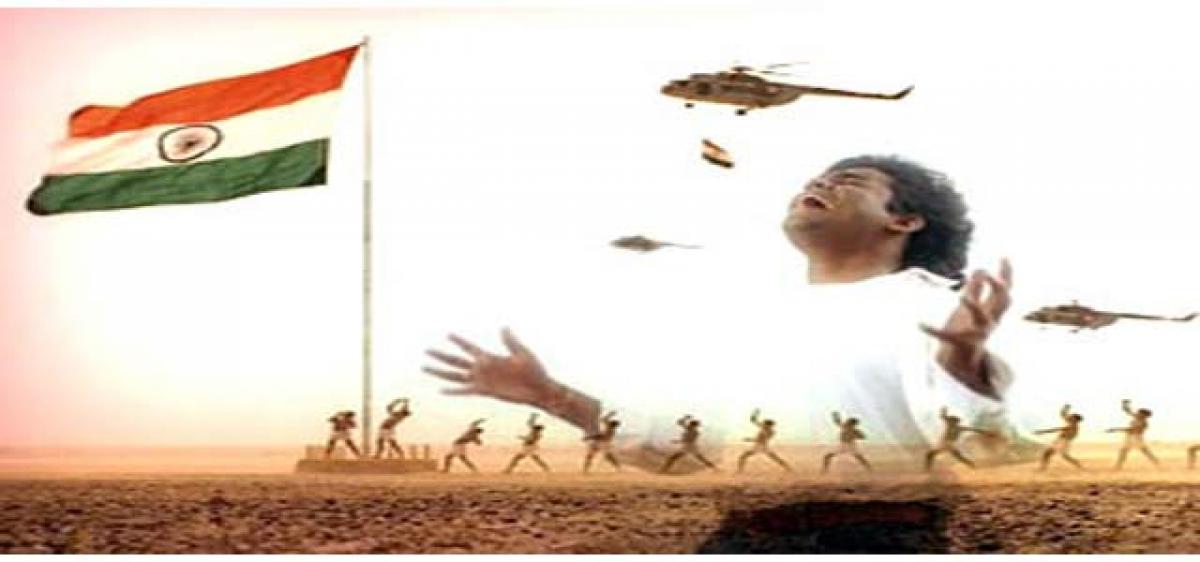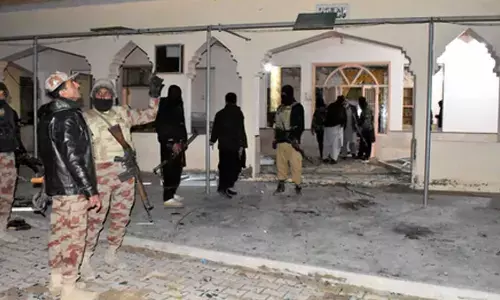Just another patriotic song?

A tempest in a teapot! That is the sum total of the zero sum charade over another petition in the Supreme Court to grant equal respect to national song Vande Mataram as given to the national anthem notwithstanding that this issue has been dealt with twice earlier. But like the proverbial bad penny, it continues to pop up intermittently. No matter that in turn our netas are only making this beauti
It is high time this frivolous and needless controversy in the hands of political drumbeaters is put to rest once and for all. Singing Vande Mataram must neither be made a test case of patriotism nor should people be obstinate about not singing it, even as it is compulsorily played at the end of every session of Parliament
A tempest in a teapot! That is the sum total of the zero sum charade over another petition in the Supreme Court to grant equal respect to national song Vande Mataram as given to the national anthem notwithstanding that this issue has been dealt with twice earlier. But like the proverbial bad penny, it continues to pop up intermittently. No matter that in turn our netas are only making this beautiful and melodious melody behsura!
Undeniably, Vande Mataram ignited patriotism, galvanised Indians to gang up against the British, threw out the firangis and won India its freedom. However, the learned judges felt that while Jana Gana Mana had been declared the national anthem by our founding fathers, they would refrain from changing its nomenclature.
In fact, in November last it ordered the “national anthem to be played before the start of a film in all cinema halls with all present obliged to stand up to show respect as part of their secret obligation to abide by the ideals engrafted in the Constitution,” dubbing it as “Constitutional patriotism.”
To be fair, perhaps, the petitioner was only taking a leaf from the Constituent Assembly debate on 24th January 1950, which resolved that Vande Mataram would enjoy “equal status” with Jana Gana Mana. But many assert that the national song is just another prop to celebrate the nation-state and undue importance must not be given to it.
Others aver that singing Vande Mataram must neither be made a test case of patriotism nor should people be obstinate about not singing it, even as it is compulsorily played at the end of every session of Parliament.
In fact, the UPA government’s HRD Ministry issued an innocuous order to all state governments in August 2006, making singing of Vande Mataram compulsory in all schools on 7th September to mark completion of its centenary celebrations as the national song, little realising that it would have the Muslims up in arms and lead to a cacophony of discordant political notes.
Muslim clerics in UP opposed the national song on the ground that singing it was anti-Islamic and amounted to worshipping the motherland. This went against the concept of tawheed (oneness of God), according to which a Muslim cannot supplicate to anyone except Allah. Expectedly, the government retracted the order, making the song's recitation voluntary.
Again in 2009, the widely respected Jamiat Ulema-i-Hind (JUH) out of the blue issued a fatwa against singing Vande Mataram. In a resolution at Deoband in UP, the Islamic clerics reiterated their 2006 position, adding that patriotism didn't require singing Vande Mataram in schools.
It is another matter that the fatwa was obviously to extract its pound of flesh pre-General election: Implement the Sachar Committee report.
In this context, it is pertinent to understand how and why Vande Mataram came to be recognised as a national song. Set in 19th Century India, it was written in 1875 and published for the first time in Bankim Chandra Chatterjee’s novel, Anandamatha in 1882.
The story starts with a group of sadhus who call themselves santan, the children of Bharat Mata, whose leader Satyanand is imprisoned by the Nawab. The sadhus vow to set their guru free, shout that they would throw the Muslims into the river and set their houses on fire. They not only succeed in freeing their guru but welcome British rule in India. In short, atrocity against Muslims is a recurrent theme in the novel.
When Bengal is ravaged by the famine of 1770, then under de facto rule of the East India Company, it forces the farmers to cultivate neel (cloth whitener) instead of food grains as it is a big export earner for the company. The cultivation of neel also made the fields uncultivable for the next crop, precipitating matters and triggering an anti-gora (British) peasant revolt.
From the fields to the streets, Vande Mataram soon became the popular battle cry for freedom from the British Raj. Large rallies all over the country worked themselves to a feverish pitch by shouting it. Many were jailed and the song was banned. But it failed to stop the patriotic fervour.
Nobel laureate Rabindranath Tagore sang it in 1896 at the Calcutta Congress Session and Lala Lajpat Rai started a journal called Vande Mataram from Lahore. The Congress formally adopted it as a national song through a resolution at its Varanasi Session on September 7, 1905.
Thereafter, it became the opening note for all the Congress meetings and sessions. Its powerful patriotic lines stirred the whole nation. Neta Subhash Chandra Bose made it the Indian National Army's principal song and his Singapore-based radio station regularly broadcast it.
In October 1937, some Muslim leaders objected to Vande Mataram on the ground that it contained verses that were in direct conflict with the beliefs of Islam. True, the first two stanzas of the hymn eulogise Mother India and its beautiful natural bounties with “hurrying streams, gleaming orchards…..”
But the fourth stanza of the song, for instance, addressed Mother India as, "Thou art Durga, Lady and Queen, with her hands that strike and her swords of sheen, Thou art Lakshmi lotus-throned…." It was argued that by singing this, a Muslim was forced to equate his country with the Hindu Goddesses Durga and Lakshmi. This went against the concept of Islam according to which a Muslim could not supplicate to anyone except Allah.
Nehru understood his Muslims brethrens’ religious predicament and soon worked out a compromise formula through some fine balancing, even as he underscored the hymn’s national importance in the freedom struggle. The Congress Working Committee met in Kolkata in 1937 under Nehru’s Presidentship and adopted a resolution, whereby only the first two stanzas of Vande Mataram would be sung.
Moreover, freedom was given to the organisers to sing any other song of an unobjectionable character, in addition to, or in the place of, Vande Mataram.
Interestingly, while Vande Mataram was treated as India’s national anthem for long, Jana Gana Mana was chosen as the national anthem of free India following Independence.
The song was rejected on the ground that Muslims felt offended by its depiction of the nation as Goddess Ma Durga — thus equating the nation with the Hindu conception of Shakti, divine feminine dynamic force. What is more, objection was taken to its origin as part of Anandamatha, viewed as a novel with an anti-Muslim message.
In the ultimate, we need to realise that India’s multi-pluralistic character, pulsating democracy and civil society is neither rigid nor frozen in time. It is constantly evolving. True, two songs cannot make or mar the future of a nation or its people, even as we respect Vande Mataram as our national song and symbol of national pride, on a par with Jana Gana Mana.
It is high time this frivolous and needless controversy in the hands of political drumbeaters is put to rest once and for all. There are more pressing issues which need our leaders and judiciary’s attention. What says you?










